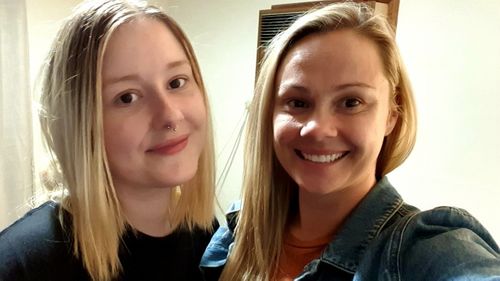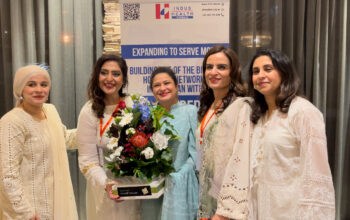Sisters hope special gift will save young mum’s life
Childcare worker Sarah Stevenson is preparing to give her sister a gift like no other this week.
The 29-year-old is donating stem cells to sister Emma Drummond.
The mother-of-two, 24, is facing a rare form of blood cancer which could kill her.

Ms Stevenson, from Sydney’s Northern Beaches, said she’s hoping her donation, which will be taken at the Prince of Wales Hospital this week and later given to Ms Drummond, could save her sister’s life.
Stem cells, which are collected from bone marrow, can develop into any cells of the body and could help stop the cancer.
“That’s what I’m hoping for,” she told 9news.com.au.
“That would be extremely amazing of being able to give that gift to her, to be able to go on with life.
“She’s one of the strongest women that I know. She’s just a beautiful soul.”

Ms Drummond, from the NSW town of Dapto, has myelodysplastic syndrome, a type of cancer which could turn into leukaemia.
The syndrome kills ten people every week in Australia – but it’s rare in somebody so young.
She was diagnosed when pregnant with her youngest child, Charlie, now five months.
She has been told if it progresses into leukaemia, she could have only months to live.

But it’s hoped her sister’s stem cells, which will be taken from her arm and, if needed, from her hip bone via surgery, will stop that happening.
Ms Drummond will be given intense chemotherapy before the transplant is done.
“I keep saying, ‘thank you, what you are giving me is amazing’,” she said.
“She says, ‘you’re my sister’, there’s no hesitation.”
However, the sisters are only a 50 per cent match for each other and there’s a chance Ms Drummond’s body could reject the transplant.
Ms Drummond has been told she does have a better match on international donation registers in Germany.
But because of the pandemic, she cannot access it.
“It’s just scary because she’s not a 100 per cent match, if I get sick or get an infection, that’s it, I’m gone,” she said.
She is urging people to join the Australian Donor Registry to give more people access to donors in the country, especially people like her with Indigenous heritage, who are underrepresented.
Rare cancer-causing condition
This cancer battle is not likely to be Ms Drummond’s last.
She has a rare gene mutation and has been told she’s likely to keep developing cancer.
It’s called Li-Framauni syndrome and means her body can’t fight cancer cells.
She battled bone cancer when she was 18, with her current cancer battle thought to have been caused by the chemotherapy she had for that.
She has already had a preventative mastectomy for breast cancer.
Both her children also have the genetic condition, which she describes as “devastating”.
Casey-Lee, six, has already had a tumour in her stomach which surgeons removed, and is having medical checks every six weeks.

Ms Drummond says while it was a shock diagnosis for the whole family, she tries not to worry.
“It’s hard to deal with. I’m waiting around for cancer,” she said.
Partner James Adam has had to stop working as a contractor to take care Ms Drummond, and a fundraising page has been launched for the family.
Leukaemia Foundation CEO Chris Tanti said it is working to try and solve issues of securing international bone marrow donations during the COVID-19 pandemic.
The foundation also needs more people to join the Australian Donor Registry.
More than 70 per cent of Australians with blood cancer who need a stem cell transplant, around 600 people a year, must look outside their own family for a donor.
But less than five per cent of people on the Australian Donor Registry are ideal matches, which forces an international search.
“The vast majority of stem cells donated to Australian patients come from overseas donors,” Mr Tanti said.
“Pandemic or no pandemic, these cells have a long way to travel, and transport delays can cost lives.”

There’s a call for more 18- to 35-year-olds to sign up, because patients do better with younger donors.
People will only be asked to donate if a patient matches with them, with the initial procedure similar to giving blood.
Join the stem cell transplant register at StrengthtoGive.org.au.
For more information about blood cancer visit leukaemia.org.au.
Email reporter Sarah Swain- Sswain@nine.com.au








